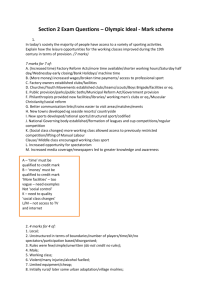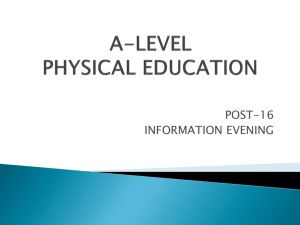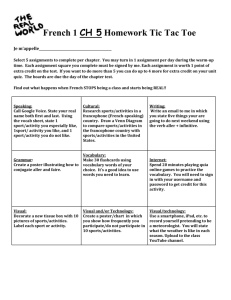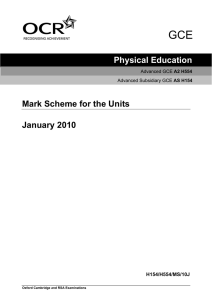PE Part 2
advertisement
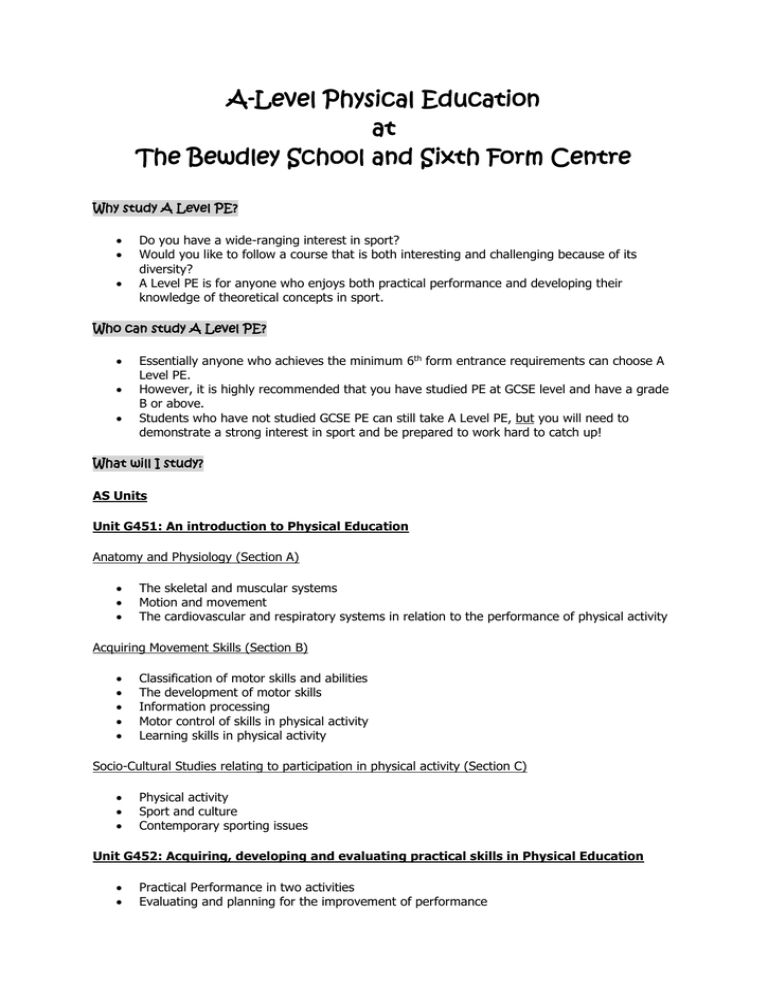
A-Level Physical Education at The Bewdley School and Sixth Form Centre Why study A Level PE? Do you have a wide-ranging interest in sport? Would you like to follow a course that is both interesting and challenging because of its diversity? A Level PE is for anyone who enjoys both practical performance and developing their knowledge of theoretical concepts in sport. Who can study A Level PE? Essentially anyone who achieves the minimum 6th form entrance requirements can choose A Level PE. However, it is highly recommended that you have studied PE at GCSE level and have a grade B or above. Students who have not studied GCSE PE can still take A Level PE, but you will need to demonstrate a strong interest in sport and be prepared to work hard to catch up! What will I study? AS Units Unit G451: An introduction to Physical Education Anatomy and Physiology (Section A) The skeletal and muscular systems Motion and movement The cardiovascular and respiratory systems in relation to the performance of physical activity Acquiring Movement Skills (Section B) Classification of motor skills and abilities The development of motor skills Information processing Motor control of skills in physical activity Learning skills in physical activity Socio-Cultural Studies relating to participation in physical activity (Section C) Physical activity Sport and culture Contemporary sporting issues Unit G452: Acquiring, developing and evaluating practical skills in Physical Education Practical Performance in two activities Evaluating and planning for the improvement of performance A2 Units Unit G453: Principles and concepts across different areas of Physical Education Section A: Socio-Cultural Options Historical Studies (Option A1) Popular recreation in pre-industrial Britain Rational recreation in post-industrial Britain 19th-century public schools and their impact on the development of physical activities and young people The developmental stages of athleticism in 19th-century public schools Case Studies Drill, physical training and Physical Education in state schools Comparative Studies (Option A2) The United Kingdom (UK) The United States of America (USA) Australia Section B: Scientific Options Sports Psychology (Option B1) Individual aspects of performance Group dynamics of performance and audience effects Mental preparation for physical activity Exercise and Sport Physiology (Option B3) Energy Health components of physical fitness Application of the principles of training Performance enhancement Unit G454: The Improvement of effective performance and the critical evaluation of practical activities in Physical Education Performance in one activity Evaluation, appreciation and the improvement of performance How will I learn? Lessons are a mixture of practical and theory There are a variety of teaching methods used The PE teaching team has built up a strong reputation for delivering lessons which are stimulating, challenging and exciting Additional support sessions are available for students experiencing difficulties, and opportunities to attend revision workshops are provided You will be expected to complete independent study to extend your knowledge How will my work be monitored? You will have regular end of unit assessment tests in each discipline The PE team meets regularly to discuss individual progress, attainment and effort. This informs report writing, parents evening and estimated grades You will have regular file checks to ensure your notes are in order and you are equipped with the necessary information for the exam You should also make sure you monitor and record your own progress using your A Level PE Guide How is A Level PE assessed? AS Level 2 hour theoretical exam worth 60% of the total AS marks, and 30% of the total A Level marks Practical exam in two activities, and an oral exam testing your ability to observe, evaluate and improve performance. Worth 40% of the total AS marks, and 20% of the total A Level marks A2 Level 2.5 hour theoretical exam worth 35% of the total A Level marks Practical exam in one activity and an oral exam testing your ability to observe, evaluate and improve performance. This is worth 15% of the total A Level marks AS or A2? Module Title Method of Assessment Key Concepts AS G451 2 hour Anatomy and Physiology 3 question Acquiring Movement Skills 90 mark Socio Cultural Studies AS G452 A2 G453 A2 G454 Exam Paper Practical 2 activities from 2 activity profiles Performance and Oral response 2 hour 30min Exercise + Sport Physiology 3 from 5 Qs Sports Psychology 105 mark Comparative or History Exam Paper Practical and oral response 1 activity profile taken from AS selection. What is it What is How much worth at it worth does it AS? at A2? contribute to a full A Level? 60% 0 30% 40% 0 20% 0 70% 35% 0 30% 15% Who will deliver the course? There is a blend of youth and experience amongst the team; the current team consists of Mr Rex, Mr Pigford and Mr Beech. With the course delivered by experienced and specialist teachers, you know you are learning from the best and you will never get bored! What subjects go well with PE? A Level PE can be taken alongside a variety of subjects We have had students with all kinds of successful combinations and it depends on what you want to pursue as a career Common choices include Biology, Psychology, Sociology, What can I do with my A Level qualification? Studying PE at A Level can be a useful 'stepping stone' towards a variety of career options in the sporting sector This could be in the leisure industry, teaching, physiotherapy, coaching, sports psychology, sports journalism and sports medicine, to name but a few However, due to its diversity and well respected theoretical foundations, there are many different career paths that the course can lead on to - not just sport related!
